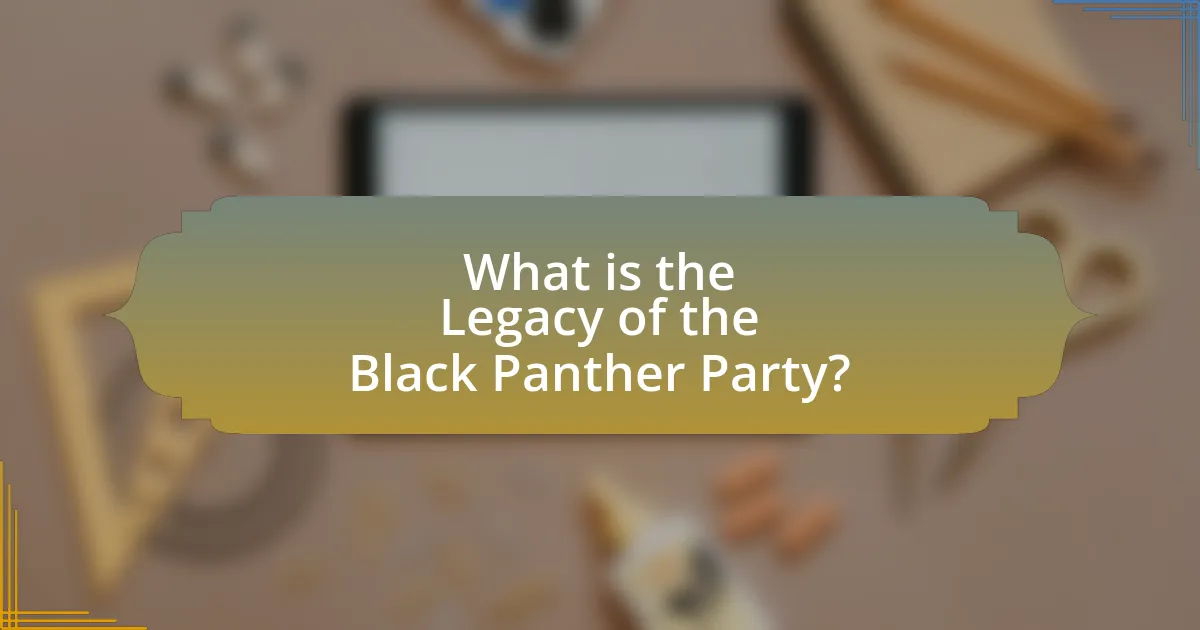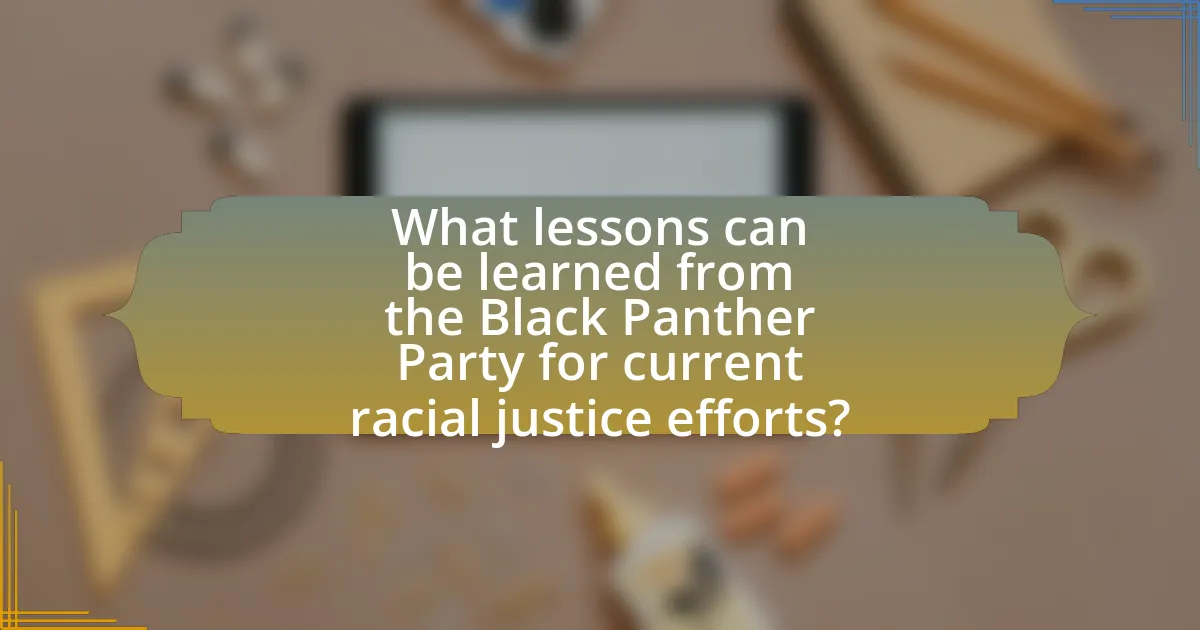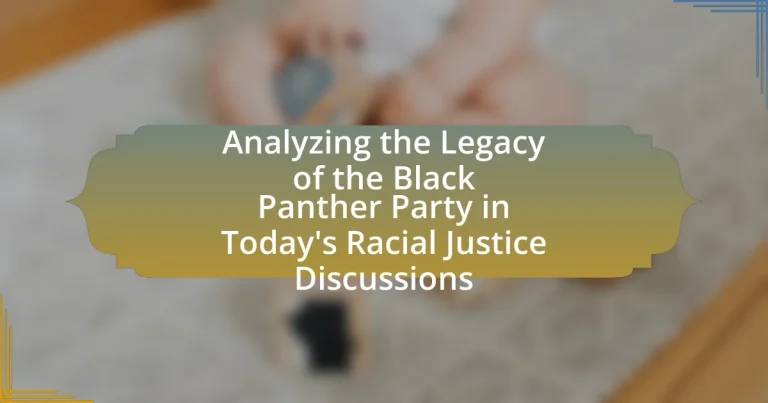The Black Panther Party, established in 1966, played a crucial role in shaping civil rights activism and social justice movements in the United States. This article analyzes the party’s legacy, highlighting its advocacy for self-defense against police brutality, community empowerment, and the implementation of social programs such as free breakfast for children and health clinics. It examines the party’s emergence in response to systemic racial injustice, its core principles and goals, and its influence on contemporary movements like Black Lives Matter. Additionally, the article discusses the evolution of public perception regarding the Black Panther Party and the lessons modern activists can learn from its strategies for community organizing and coalition-building in the ongoing fight for racial justice.

What is the Legacy of the Black Panther Party?
The legacy of the Black Panther Party is characterized by its profound influence on civil rights activism and social justice movements. Established in 1966, the party advocated for self-defense against police brutality and systemic racism, significantly shaping the discourse around racial equality in the United States. Their community programs, such as free breakfast for children and health clinics, demonstrated a commitment to social welfare, which inspired similar initiatives across the nation. The Black Panther Party’s emphasis on armed self-defense and militant activism challenged the status quo, prompting a reevaluation of law enforcement practices and civil rights strategies. Their impact is evident today, as contemporary movements like Black Lives Matter draw on the party’s principles to address ongoing issues of racial injustice and police violence.
How did the Black Panther Party emerge in the context of racial justice?
The Black Panther Party emerged in 1966 as a response to systemic racial injustice and police brutality against African Americans. Founded by Huey P. Newton and Bobby Seale in Oakland, California, the organization aimed to address the urgent need for self-defense and community empowerment in the face of pervasive discrimination and violence. The party’s establishment was influenced by the civil rights movement’s limitations in achieving immediate change, leading to a more militant approach to advocating for racial justice. The Black Panther Party implemented community programs, such as free breakfast for children and health clinics, which highlighted their commitment to social justice and equality, further solidifying their role in the broader struggle for civil rights during a tumultuous era in American history.
What were the key events that led to the formation of the Black Panther Party?
The key events that led to the formation of the Black Panther Party include the increasing violence against African Americans, the civil rights movement’s push for systemic change, and the founding of the Black Panther Party for Self-Defense in 1966 by Huey P. Newton and Bobby Seale in Oakland, California. The assassination of civil rights leaders and police brutality against Black communities heightened the urgency for self-defense and community empowerment. The party’s initial focus on armed patrols to monitor police activity and community social programs, such as free breakfast for children, reflected a response to systemic oppression and a desire for social justice. These events collectively catalyzed the establishment of the Black Panther Party as a significant force in the fight for racial equality.
Who were the founding members and what were their motivations?
The founding members of the Black Panther Party were Huey P. Newton and Bobby Seale, established in 1966. Their motivations included addressing systemic racism, police brutality, and social injustices faced by African Americans, aiming to create a revolutionary movement that would empower Black communities through self-defense and community programs. The party’s Ten-Point Program outlined their demands for equality, justice, and an end to oppression, reflecting their commitment to social change and civil rights.
What were the core principles and goals of the Black Panther Party?
The core principles and goals of the Black Panther Party included the promotion of self-defense, community empowerment, and social justice for African Americans. The party aimed to address systemic racism and economic inequality through initiatives such as free breakfast programs for children, health clinics, and educational services. Founded in 1966, the Black Panther Party sought to challenge police brutality and advocate for the rights of marginalized communities, emphasizing the need for armed self-defense against oppression. Their Ten-Point Program outlined specific demands, including full employment, decent housing, and an end to police violence, reflecting their commitment to achieving social and economic justice.
How did the Black Panther Party define its mission regarding racial justice?
The Black Panther Party defined its mission regarding racial justice as a commitment to combating systemic oppression and advocating for the rights of African Americans. This mission was articulated through their Ten-Point Program, which demanded justice, equality, and an end to police brutality. The Party aimed to empower Black communities by providing essential services, such as free breakfast programs and health clinics, while also promoting self-defense against racial violence. Their approach was rooted in the belief that true justice could only be achieved through revolutionary change and community solidarity, as evidenced by their active engagement in civil rights activism and grassroots organizing throughout the 1960s and 1970s.
What social programs did the Black Panther Party implement to support communities?
The Black Panther Party implemented several social programs to support communities, including the Free Breakfast for Children Program, community health clinics, and educational initiatives. The Free Breakfast for Children Program, launched in 1969, provided nutritious meals to thousands of children before school, addressing food insecurity. The party established community health clinics, known as “People’s Clinics,” which offered free medical care and education, focusing on preventive health measures and addressing issues like sickle cell anemia. Additionally, the Black Panther Party initiated educational programs, such as the Black Panther Newspaper, which informed the community about civil rights issues and provided political education. These programs were part of the party’s broader mission to empower African American communities and combat systemic inequalities.
How did the Black Panther Party influence the civil rights movement?
The Black Panther Party significantly influenced the civil rights movement by advocating for armed self-defense and community empowerment, which challenged the nonviolent approach of mainstream civil rights organizations. Founded in 1966, the Party implemented community programs such as free breakfast for children and health clinics, addressing systemic inequalities and inspiring grassroots activism. Their emphasis on Black pride and self-determination galvanized a new generation of activists, leading to increased awareness of racial injustices and the need for systemic change. The Party’s confrontational stance against police brutality and their visibility in urban areas highlighted the urgent need for civil rights reforms, ultimately shaping the discourse around race and justice in America.
What strategies did the Black Panther Party use to advocate for change?
The Black Panther Party employed several strategies to advocate for change, including community programs, armed self-defense, and political education. They established initiatives like free breakfast programs for children and health clinics to address immediate community needs, demonstrating their commitment to social welfare. Additionally, the party organized armed patrols to monitor police activity, asserting their right to self-defense against police brutality, which highlighted systemic injustices. Political education sessions were conducted to raise awareness about civil rights and empower community members, fostering a sense of agency and activism. These strategies collectively aimed to challenge systemic oppression and promote social justice.
How did the Black Panther Party’s approach differ from other civil rights organizations?
The Black Panther Party’s approach differed from other civil rights organizations primarily through its emphasis on armed self-defense and community empowerment. Unlike mainstream civil rights groups that often advocated for nonviolent protest and legal reform, the Black Panther Party adopted a more militant stance, believing that self-defense against police brutality was necessary. This was exemplified by their open carry of firearms and the establishment of community programs, such as free breakfast for children and health clinics, which aimed to address systemic inequalities directly. The party’s focus on revolutionary socialism and its critique of capitalism also set it apart, as it sought to fundamentally change societal structures rather than merely seek integration or civil rights within the existing system.
How is the Black Panther Party’s legacy relevant in today’s racial justice discussions?
The Black Panther Party’s legacy is relevant in today’s racial justice discussions as it laid the groundwork for contemporary movements advocating for systemic change and social equity. The Party’s focus on community empowerment, self-defense against police brutality, and the establishment of social programs directly informs current activism, such as Black Lives Matter. For instance, the Black Panther Party initiated free breakfast programs and health clinics, which serve as models for modern grassroots initiatives aimed at addressing social disparities. Additionally, the Party’s emphasis on intersectionality and solidarity among marginalized groups resonates with today’s calls for inclusive justice, highlighting the ongoing struggle against racial and economic inequality.
What contemporary movements draw inspiration from the Black Panther Party?
Contemporary movements that draw inspiration from the Black Panther Party include Black Lives Matter, the Movement for Black Lives, and various grassroots organizations advocating for racial justice and community empowerment. Black Lives Matter, founded in 2013, emphasizes systemic racism and police violence, echoing the Black Panther Party’s focus on self-defense and community safety. The Movement for Black Lives, a coalition of organizations, seeks to address issues of racial inequality and economic justice, reflecting the Panthers’ original goals of social and economic reform. Additionally, organizations like the Dream Defenders and the Black Youth Project 100 continue to promote the principles of community organizing and direct action that were central to the Black Panther Party’s mission.
How do modern activists reference the Black Panther Party’s strategies?
Modern activists reference the Black Panther Party’s strategies by adopting their community organizing techniques, self-defense principles, and emphasis on social justice. For instance, contemporary movements like Black Lives Matter utilize grassroots mobilization and mutual aid initiatives, echoing the Panthers’ focus on community empowerment and direct action. Additionally, the Panthers’ approach to police brutality and systemic racism informs current protests and advocacy efforts, as seen in the widespread calls for police reform and accountability. The Black Panther Party’s legacy is evident in the way modern activists frame their demands for equity and justice, drawing parallels to the Panthers’ original ten-point program, which outlined specific goals for social change.
What parallels can be drawn between the Black Panther Party and today’s racial justice movements?
The Black Panther Party and today’s racial justice movements share a commitment to addressing systemic racism and advocating for marginalized communities. Both movements emphasize the importance of community empowerment, self-defense against police brutality, and the necessity of social programs to support those in need. For instance, the Black Panther Party established free breakfast programs and health clinics, paralleling contemporary movements that advocate for social services and community resources as essential components of racial justice. Additionally, both movements utilize grassroots organizing and social media to mobilize support and raise awareness, reflecting a continuity in strategies aimed at achieving equity and justice for Black individuals and communities.
How has the perception of the Black Panther Party evolved over time?
The perception of the Black Panther Party has evolved from viewing it as a militant and radical organization to recognizing it as a significant force in the fight for civil rights and social justice. Initially, during the late 1960s and early 1970s, the Black Panther Party was often portrayed negatively in mainstream media, emphasizing its confrontational tactics and armed self-defense against police brutality. However, over time, scholars and activists have highlighted the Party’s community programs, such as free breakfast initiatives and health clinics, which aimed to address systemic inequalities. This shift in perception has been supported by historical analyses that emphasize the Party’s role in advocating for Black empowerment and social change, contributing to contemporary discussions on racial justice and equality.
What role does media representation play in shaping the legacy of the Black Panther Party?
Media representation significantly influences the legacy of the Black Panther Party by shaping public perception and historical narrative. The portrayal of the Black Panther Party in various media outlets, particularly during the late 1960s and early 1970s, often emphasized their militant image while downplaying their community service initiatives, such as free breakfast programs and health clinics. This skewed representation contributed to a lasting stereotype of the party as violent radicals, overshadowing their contributions to civil rights and social justice. Research indicates that media framing can alter public understanding and memory of social movements, as seen in the work of scholars like Todd Gitlin in “The Sixties: Years of Hope, Days of Rage,” which discusses how media narratives can shape collective memory. Thus, the media’s role in representing the Black Panther Party has been crucial in defining its legacy within the broader context of racial justice discussions today.
How do different communities view the Black Panther Party today?
Different communities view the Black Panther Party today through varied lenses, often shaped by historical context and contemporary social issues. In African American communities, the Black Panther Party is frequently seen as a symbol of resistance against systemic racism and police brutality, celebrated for its community programs like free breakfast for children and health clinics. Conversely, some white communities may perceive the party more critically, associating it with violence and radicalism, influenced by historical media portrayals and government narratives. Additionally, younger generations, regardless of race, often engage with the party’s legacy through a lens of social justice, recognizing its role in inspiring modern movements like Black Lives Matter. This multifaceted perception reflects ongoing discussions about race, equity, and justice in America.

What lessons can be learned from the Black Panther Party for current racial justice efforts?
The Black Panther Party teaches current racial justice efforts the importance of community empowerment and self-defense against systemic oppression. Their establishment of community programs, such as free breakfast for children and health clinics, demonstrates the effectiveness of grassroots initiatives in addressing immediate needs while fostering solidarity. Additionally, their emphasis on armed self-defense against police brutality highlights the necessity of protecting marginalized communities from violence. Historical context shows that the Black Panther Party’s activism led to significant policy changes, such as the eventual implementation of some social programs by the government, illustrating the potential impact of organized resistance.
What strategies from the Black Panther Party can be applied to modern activism?
The strategies from the Black Panther Party that can be applied to modern activism include community organizing, self-defense, and the establishment of social programs. Community organizing, exemplified by the Black Panther Party’s grassroots mobilization efforts, empowers individuals to address local issues collectively, fostering solidarity and collective action. Self-defense, as advocated by the Party, emphasizes the right to protect oneself against systemic violence, which resonates with contemporary movements advocating for personal and community safety. Additionally, the Party’s social programs, such as free breakfast initiatives and health clinics, demonstrate the importance of addressing immediate community needs while advocating for systemic change, a strategy that modern activists can adopt to build trust and support within their communities. These strategies highlight the effectiveness of grassroots engagement, self-empowerment, and direct action in the pursuit of social justice.
How can community organizing be informed by the Black Panther Party’s methods?
Community organizing can be informed by the Black Panther Party’s methods through their emphasis on grassroots mobilization, community self-defense, and the establishment of social programs. The Black Panther Party effectively organized local communities by creating initiatives such as free breakfast programs and health clinics, which addressed immediate needs and built trust within the community. Their approach demonstrated the importance of empowering individuals through education and direct action, fostering a sense of agency among marginalized populations. Historical evidence shows that these methods not only mobilized community members but also attracted national attention to issues of racial injustice, illustrating the effectiveness of organized, community-driven efforts in advocating for systemic change.
What are the best practices for coalition-building inspired by the Black Panther Party?
The best practices for coalition-building inspired by the Black Panther Party include fostering community engagement, prioritizing intersectionality, and emphasizing mutual aid. The Black Panther Party effectively mobilized diverse groups by actively involving community members in decision-making processes, ensuring that their voices were heard and valued. This approach created a sense of ownership and commitment among participants. Additionally, the Party recognized the importance of intersectionality, addressing the interconnectedness of various social justice issues, which allowed for broader alliances across different demographics. The emphasis on mutual aid, exemplified by programs like free breakfast for children and health clinics, demonstrated the power of collective support and resource sharing, reinforcing solidarity among coalition members. These practices highlight the importance of inclusivity, shared goals, and community-driven initiatives in successful coalition-building efforts.
How can individuals contribute to racial justice in the spirit of the Black Panther Party?
Individuals can contribute to racial justice in the spirit of the Black Panther Party by engaging in community organizing and advocacy for systemic change. The Black Panther Party emphasized grassroots activism, focusing on empowering marginalized communities through education, health services, and political engagement. For instance, individuals can participate in local initiatives that promote social welfare, such as food distribution programs or educational workshops, similar to the Panthers’ Free Breakfast for Children Program, which served thousands of children in the 1970s. Additionally, advocating for policy reforms that address racial disparities in criminal justice, housing, and healthcare aligns with the Party’s mission to challenge systemic oppression. Historical evidence shows that the Black Panther Party’s community programs significantly improved the quality of life for many African Americans, demonstrating the effectiveness of organized, community-driven efforts in achieving racial justice.
What actions can individuals take to support racial justice initiatives today?
Individuals can support racial justice initiatives today by actively participating in community organizing and advocacy efforts. Engaging in local organizations that focus on racial equity, such as the NAACP or local grassroots movements, allows individuals to contribute to systemic change. Additionally, individuals can educate themselves and others about racial issues through workshops, reading materials, and discussions, fostering a more informed community. Supporting Black-owned businesses and initiatives directly impacts economic equity, as studies show that economic empowerment is crucial for racial justice. Furthermore, individuals can use their platforms, whether social media or community forums, to amplify marginalized voices and raise awareness about racial injustices. These actions collectively contribute to a broader movement for racial justice, reflecting the ongoing legacy of organizations like the Black Panther Party, which emphasized community empowerment and activism.
How can education about the Black Panther Party enhance community engagement?
Education about the Black Panther Party can enhance community engagement by fostering awareness of social justice issues and empowering individuals to take action. The Black Panther Party, founded in 1966, advocated for the rights of African Americans and addressed systemic inequalities through community programs, such as free breakfast for children and health clinics. By educating communities about these initiatives, individuals can recognize the importance of grassroots activism and collective action in addressing contemporary social issues. Historical context shows that the Black Panther Party’s efforts led to increased political participation and community organizing, which are essential for effective engagement in today’s racial justice discussions.


